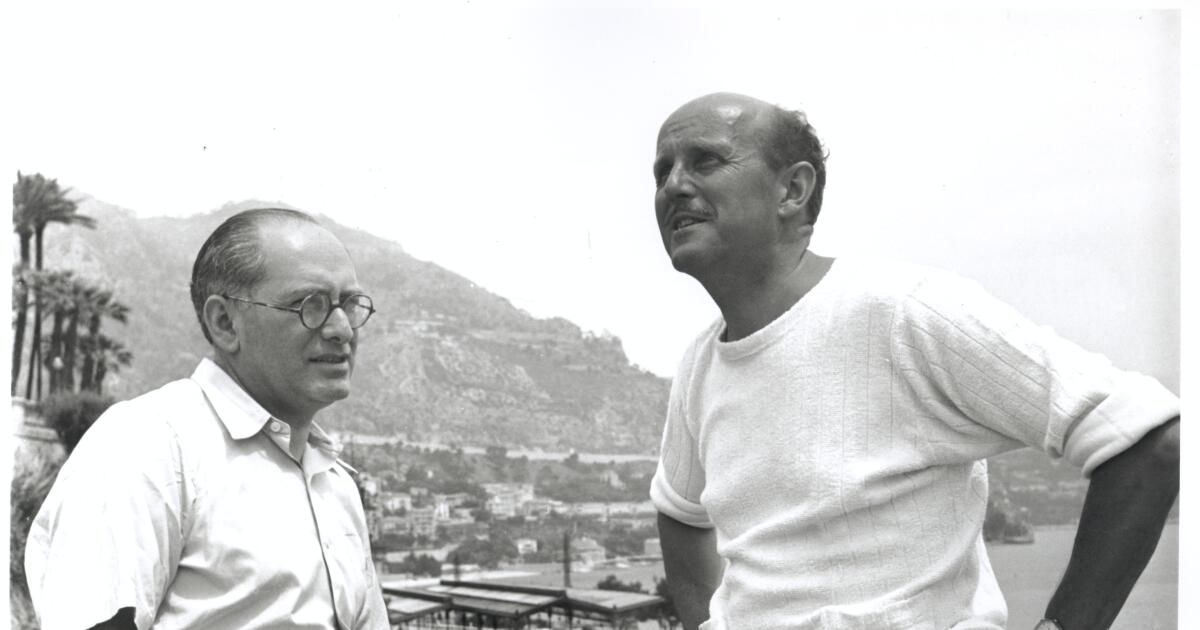Those who believe that filmmaking is inherently collaborative know that the films written, produced and directed by the Englishman Michael Powell and the Hungarian Emeric Pressburger demonstrate this brilliantly. Their 1940s classics — a series of visionary team-ups spanning wartime to peacetime, including “The Life and Death of Colonel Blimp,” “Black Narcissus” and “The Red Shoes” — are timeless incantations that opened up the art form in deeply human, subversive and undeniably magical ways.
One enthusiastic convert was Martin Scorsese, an asthmatic child glued to the family television set, especially fascinated by the operatic fantasy “The Tales of Hoffman,” even when it was broadcast fuzzily through a tiny black-and-white set. Since becoming a director (and befriending Powell in the 1970s), Scorsese has made championing their films a lifelong mission, in recognition of their subconscious inspiration in his own work.
There is clearly no better storyteller than an obsessive like Scorsese to delve into the archives of the duo’s unusual and extraordinary work. It is his candid analysis as the host of filmmaker David Hinton’s documentary “Made in England: The Films of Powell and Pressburger” that sets this rewarding, personalized master class above most films about films. (Its release also coincides wonderfully with the Academy Museum’s current restoration-filled retrospective, “Tellers of Tales,” on view through Aug. 19.)
Both Powell and Pressburger served their apprenticeships abroad: the former in France under silent film stalwart Rex Ingram of MGM, the latter as a screenwriter in Berlin at the legendary UFA studios. They later met, through producer Alexander Korda, in mid-1930s England (Presburger defined his emigration as “being born at 33”). In an excerpt from a later interview, Powell charmingly recounts his initial admiration for the Hungarian’s narrative talent, which he calls “a wonderful mind.”
Their pioneering creative partnership — eventually known as The Archers, with their distinctive bull’s-eye logo — was forged amid Britain’s need for wartime propaganda and cemented the thematic seriousness and technical wit that adorn films like “Colonel Blimp,” their patriotic satire of British wartime leadership, and “A Matter of Life and Death,” the trial-in-the-sky fantasy romance. But the duo also fascinatingly fused romantic comedy and spiritual fable (“I Know Where I’m Going!”), brought a feverish life to a Himalayan convent built on a soundstage (“Black Narcissus”) and, perhaps most appropriately for these fierce protectors of the artistic life, turned a ballerina’s professional dilemma into “The Red Shoes,” a masterpiece of dreamlike passion. Of that film’s sweeping, avant-garde 15-minute ballet sequence, Scorsese says, with an almost silent bow, that “you had the feeling that anything could happen.”
Moira Shearer in the film “The Red Shoes”.
(UCLA Film and Television Archive)
The partnership couldn’t last, a sadly familiar story that began with the loss of total control, and when Powell (without Pressburger) made “Peeping Tom” in 1960, about a psychopathic filmmaker, it seemed that no one wanted the strange dream he was conjuring any more. Powell and Pressburger’s friendship endured, but their reputations, unlike those of British giants David Lean, Carol Reed and Alfred Hitchcock, seemed to go the way of a fading Highland fog. That changed with the attention of people like Scorsese, the stewardship of Scorsese’s longtime editor Thelma Schoonmaker (who became Powell’s wife and widow) and the rise of a film culture more tolerant of uncompromising art.
As enlightening as Made in England’s outlook is, with Adrian Johnston’s original score playing like the theme from a lost work of theirs, it’s also a beautiful reminder that the love of our favourite films is an evolving relationship. The films themselves may be stagnant, but the feelings they evoke can seem limitless. Scorsese is particularly moving in discussing this, citing Colonel Blimp and its wise, witty, wistful tale of old ways, as an ever-deepening companion to his life over the years. Great art will always have that influence, and with any luck Made in England will not only spur a re-watching frenzy for Powell and Pressburger fans, but give birth to new ones.
'Made in England: The Powell and Pressburger Films'
Unrated
Execution time: 2 hours, 13 minutes
Playing: In limited release on Friday, July 26












